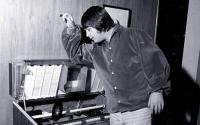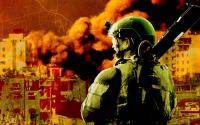20 November 2003Znet
John Pilger is a veteran journalist and documentary filmmaker. In a career that spans more than three decades, he has reported from the scenes of some of the U.S. government's most terrible war crimes--from Vietnam and Southeast Asia, to the frontline states attacked by apartheid South Africa, to Palestine and Iraq in the Middle East.
In his new documentary, Breaking the Silence: Truth and Lies in the War on Terror, Pilger demolishes the case for going to war on Iraq as it was put forward by George W. Bush and British Prime Minister Tony Blair. In particular, Pilger uncovered videotape footage from 2001 of Secretary of State Colin Powell and National Security Adviser Condoleezza Rice admitting the truth--that Iraq wasn't a military threat and had not developed weapons of mass destruction since the first Gulf War a decade before. The documentary premiered on British television in September. Pilger's most recent book, The New Rulers of the World, is a collection of several essays that was updated and expanded to take up George W. Bush's "war on terror."
Here, Pilger talks to Socialist Worker's ANTHONY ARNOVE about why the U.S. went to war--and why its colonial occupation is in crisis.
- - - - - - - - - - - - - - - -
IN YOUR new documentary, you expose evidence that Colin Powell and Condoleezza Rice knew that Iraq was not a threat. Can you describe this evidence?
IT'S THERE in their own words. I found some extraordinary archive footage in the middle of looking at hours of the Bush gang's pronouncements, which I used in Breaking the Silence.
In Cairo, Egypt, on February 24, 2001, Powell said: "He [Saddam Hussein] has not developed any significant capability with respect to weapons of mass destruction. He is unable to use conventional power against his neighbors." This, of course, is the very opposite of what Bush and Blair told their respective peoples.
Powell even boasted that it was the U.S. policy of "containment" that had effectively disarmed the Iraqi dictator--again, the opposite of what Bush and Blair said time and again. On May 15, 2001, Powell went further and said that Saddam Hussein had not been able to "build his military back up or to develop weapons of mass destruction" for "the last 10 years." America, he said, had been successful in keeping him "in a box."
Two months later, Condoleezza Rice also described a weak, divided and militarily defenseless Iraq. "Saddam does not control the northern part of his country," she said. "We aim to keep his arms from him. His military forces have not been rebuilt."
So here were two of Bush's most important officials putting the lie to their own subsequent propaganda.
NOW THAT the war is over, how does Tony Blair's "dossier" on Iraq's weapons of mass destruction program hold up to scrutiny?
IT'S A laughing stock. Part of it was plagiarized from an American student's PhD thesis. Even his spelling mistakes were used, and terms like "opposition groups" were changed to "terrorist groups." This is seriously incompetent lying. The rest of the dossier has been refuted by Blair's senior intelligence officials, even his own chief of staff, in appearances before the Hutton Inquiry.
HAVE YOU found any information regarding the claim that Iraq was linked to al-Qaeda?
NONE. INDEED, my two best sources for this are the president of the United States and his defense secretary, who within days of each other in September dismissed the very notion that Iraq and al-Qaeda were linked. This is the measure of their cynicism. Lie to the nation and the world, so that a majority of Americans believe you, then quietly refute it. Looking at all the reports, there is no evidence even now that al-Qaeda is in Iraq. They may well be there, but, like the weapons of mass destruction, there is no evidence.
WHAT DO you think about the Bush administration's claims that the resistance to its occupation of Iraq comes from "foreign terrorists."
HOW IRONIC it is when American officials speak about "foreign fighters" attacking Americans? It is as if Americans are Iraqis, or that Iraqis don't exist.
As Robert Fisk has pointed out, there are 200,000 foreign fighters in Iraq, and 146,000 wear U.S. uniforms. There may well be other foreign fighters in Iraq. The Anglo-American invasion was an assault on the Arab world, and I would not be surprised to see an ad hoc pan-Arab resistance. The French Resistance was assisted by foreigners, notably the British, and terrible things happened. There is no difference. The propaganda now is aimed at obfuscating the truth of a nationalist resistance.
Like it or not, to many Iraqis, Saddam Hussein embodied a certain nationalism, and the so-called "Saddam remnants" are nationalists. This is such a proud society, and not as divided tribally as some Western commentators would like us to believe.
The occupation does have parallels with Vietnam, but the closest likeness is the Soviet disaster in Afghanistan. And it really hasn't begun in earnest yet. That will happen when the Shia make their move.
I understand that a Shia army is quietly forming; they have a tradition of patience, and they will wait for their moment, just as they did under the Shah in Iran. The occupation and Bush are in deep trouble.
WHY DO you think the corporate media, especially in the U.S., has been so slow to report this evidence of government deceit and distortion?
THE CORPORATE media is an extension of the state. That is a truism, which is almost never taught at media schools. Look back on the reporting of the McCarthy period; read the papers, listen to the radio archives. With honorable exceptions, there is an uncanny echo of today. For most of his rise, McCarthy's bile was channeled and amplified by the mainstream media.
Even the great Edward R. Murrow waited until 1954 before denouncing McCarthy, who was then beginning to fade. It was only when McCarthy made his off-the-wall accusations that the U.S. military was riddled with communists that he came unstuck, and no thanks to the media.
Now, in the 21st century, the corporate media cried wolf for extremism. Charles Lewis, who heads the Center for Public Integrity and is a former CBS journalist, told me he believed that had the media challenged Bush's deceptions, the invasion might not have happened; it would have been exposed and untenable. I agree.
That's the potential power of journalists to act as an agent of truth and the people, not of propaganda and power. It's time that journalists who are serious about their craft began examining their conscience and stop trying to distort their intellect and moral sense for the sake of the job.
IF WEAPONS of mass destruction and links to al-Qaeda were fraudulent justifications for the invasion of Iraq, what do you think was the real motivation?
IT WAS about oil, of course, and directly controlling the Middle East. Saudi Arabia, America's proxy, is unreliable these days. The U.S. wanted Iraq, an entire country, as a base, as well as its oil. Read the principal reports that Bush and Dick Cheney saw soon after the inauguration. One Council on Foreign Relations report is striking for the warning it gives, saying, in effect, "Move now and get the oil before it starts to run out, or China grabs it."
The invasion was also what Alexander Haig called "a demonstration war." It demonstrated the sheer rapaciousness of the Bush extremists, and their resolve to impose their brand of capitalism on humanity. It was sending a message: "Watch out. You might be next."
WHAT ARE conditions like for ordinary Iraqis?
I CAN'T say what the conditions are personally. But friends there tell me that it is, as one wrote, "a hell we never expected." An institute in Baghdad has done the first credible polling since the invasion, and found that a majority of Iraqis believe the situation, for ordinary people, is worse than under Saddam Hussein.
There are certainly more prisoners--at least 4,000 have been incarcerated, and possibly many more. There is collective punishment, torture, the violation of every international law on the books. Amnesty International reports on this could have been describing any totalitarian state.
YOU RECENTLY visited postwar Afghanistan. What can we learn about the occupation of Iraq from the conditions there?
WE CAN learn that America has the undisputed capacity to crush weak and mostly defenseless countries, but it has almost no capacity to control them directly thereafter. In Afghanistan, the Americans are holed up in Bagram airbase, which reminds me of the base at Pleiku in Vietnam.
They are surrounded by distrust and hostility, and they have no interest in attempting to construct the kind of colonial situation that allowed the British to control whole populations with only a few troops. I think that the U.S. will be driven out of Iraq, and the implications of that will be as serious for Bush as Vietnam was for President Lyndon Johnson.
HOW DO you see the U.S. responding to the current crisis? Do you think that they will try to retake the initiative?
America has the material power and firepower, so that is possible. But it would be artificial and short-lived.
WHAT DO you think should be the main priority for the antiwar movement?
MASS DIRECT action, however small. In every small town and on every city block, let there be voices heard and people ready to take all the risks of civil disobedience.
Do on an American stage what the Bolivian people did recently in their small impoverished country, where they toppled a president. Build momentum. Connect with the families of GIs serving in Iraq, or who have been killed and wounded there.
Remember, the antiwar movement is the democratic opposition. Now there is none other. The choices and responsibility are clearer now than at any time in my memory.
John Pilger on Bush's occupation of Iraq
"They put the lie to their own propaganda"
November 21, 2003 | Pages 4 and 5
JOHN PILGER is a veteran journalist and documentary filmmaker. In a career that spans more than three decades, he has reported from the scenes of some of the U.S. government's most terrible war crimes--from Vietnam and Southeast Asia, to the frontline states attacked by apartheid South Africa, to Palestine and Iraq in the Middle East.
In his new documentary, Breaking the Silence: Truth and Lies in the War on Terror, Pilger demolishes the case for going to war on Iraq as it was put forward by George W. Bush and British Prime Minister Tony Blair. In particular, Pilger uncovered videotape footage from 2001 of Secretary of State Colin Powell and National Security Adviser Condoleezza Rice admitting the truth--that Iraq wasn't a military threat and had not developed weapons of mass destruction since the first Gulf War a decade before. The documentary premiered on British television in September. Pilger's most recent book, The New Rulers of the World, is a collection of several essays that was updated and expanded to take up George W. Bush's "war on terror."
Here, Pilger talks to Socialist Worker's ANTHONY ARNOVE about why the U.S. went to war--and why its colonial occupation is in crisis.
- - - - - - - - - - - - - - - -
IN YOUR new documentary, you expose evidence that Colin Powell and Condoleezza Rice knew that Iraq was not a threat. Can you describe this evidence?
IT'S THERE in their own words. I found some extraordinary archive footage in the middle of looking at hours of the Bush gang's pronouncements, which I used in Breaking the Silence.
In Cairo, Egypt, on February 24, 2001, Powell said: "He [Saddam Hussein] has not developed any significant capability with respect to weapons of mass destruction. He is unable to use conventional power against his neighbors." This, of course, is the very opposite of what Bush and Blair told their respective peoples.
Powell even boasted that it was the U.S. policy of "containment" that had effectively disarmed the Iraqi dictator--again, the opposite of what Bush and Blair said time and again. On May 15, 2001, Powell went further and said that Saddam Hussein had not been able to "build his military back up or to develop weapons of mass destruction" for "the last 10 years." America, he said, had been successful in keeping him "in a box."
Two months later, Condoleezza Rice also described a weak, divided and militarily defenseless Iraq. "Saddam does not control the northern part of his country," she said. "We aim to keep his arms from him. His military forces have not been rebuilt."
So here were two of Bush's most important officials putting the lie to their own subsequent propaganda.
NOW THAT the war is over, how does Tony Blair's "dossier" on Iraq's weapons of mass destruction program hold up to scrutiny?
IT'S A laughing stock. Part of it was plagiarized from an American student's PhD thesis. Even his spelling mistakes were used, and terms like "opposition groups" were changed to "terrorist groups." This is seriously incompetent lying. The rest of the dossier has been refuted by Blair's senior intelligence officials, even his own chief of staff, in appearances before the Hutton Inquiry.
HAVE YOU found any information regarding the claim that Iraq was linked to al-Qaeda?
NONE. INDEED, my two best sources for this are the president of the United States and his defense secretary, who within days of each other in September dismissed the very notion that Iraq and al-Qaeda were linked. This is the measure of their cynicism. Lie to the nation and the world, so that a majority of Americans believe you, then quietly refute it. Looking at all the reports, there is no evidence even now that al-Qaeda is in Iraq. They may well be there, but, like the weapons of mass destruction, there is no evidence.
WHAT DO you think about the Bush administration's claims that the resistance to its occupation of Iraq comes from "foreign terrorists."
HOW IRONIC it is when American officials speak about "foreign fighters" attacking Americans? It is as if Americans are Iraqis, or that Iraqis don't exist.
As Robert Fisk has pointed out, there are 200,000 foreign fighters in Iraq, and 146,000 wear U.S. uniforms. There may well be other foreign fighters in Iraq. The Anglo-American invasion was an assault on the Arab world, and I would not be surprised to see an ad hoc pan-Arab resistance. The French Resistance was assisted by foreigners, notably the British, and terrible things happened. There is no difference. The propaganda now is aimed at obfuscating the truth of a nationalist resistance.
Like it or not, to many Iraqis, Saddam Hussein embodied a certain nationalism, and the so-called "Saddam remnants" are nationalists. This is such a proud society, and not as divided tribally as some Western commentators would like us to believe.
The occupation does have parallels with Vietnam, but the closest likeness is the Soviet disaster in Afghanistan. And it really hasn't begun in earnest yet. That will happen when the Shia make their move.
I understand that a Shia army is quietly forming; they have a tradition of patience, and they will wait for their moment, just as they did under the Shah in Iran. The occupation and Bush are in deep trouble.
WHY DO you think the corporate media, especially in the U.S., has been so slow to report this evidence of government deceit and distortion?
THE CORPORATE media is an extension of the state. That is a truism, which is almost never taught at media schools. Look back on the reporting of the McCarthy period; read the papers, listen to the radio archives. With honorable exceptions, there is an uncanny echo of today. For most of his rise, McCarthy's bile was channeled and amplified by the mainstream media.
Even the great Edward R. Murrow waited until 1954 before denouncing McCarthy, who was then beginning to fade. It was only when McCarthy made his off-the-wall accusations that the U.S. military was riddled with communists that he came unstuck, and no thanks to the media.
Now, in the 21st century, the corporate media cried wolf for extremism. Charles Lewis, who heads the Center for Public Integrity and is a former CBS journalist, told me he believed that had the media challenged Bush's deceptions, the invasion might not have happened; it would have been exposed and untenable. I agree.
That's the potential power of journalists to act as an agent of truth and the people, not of propaganda and power. It's time that journalists who are serious about their craft began examining their conscience and stop trying to distort their intellect and moral sense for the sake of the job.
IF WEAPONS of mass destruction and links to al-Qaeda were fraudulent justifications for the invasion of Iraq, what do you think was the real motivation?
IT WAS about oil, of course, and directly controlling the Middle East. Saudi Arabia, America's proxy, is unreliable these days. The U.S. wanted Iraq, an entire country, as a base, as well as its oil. Read the principal reports that Bush and Dick Cheney saw soon after the inauguration. One Council on Foreign Relations report is striking for the warning it gives, saying, in effect, "Move now and get the oil before it starts to run out, or China grabs it."
The invasion was also what Alexander Haig called "a demonstration war." It demonstrated the sheer rapaciousness of the Bush extremists, and their resolve to impose their brand of capitalism on humanity. It was sending a message: "Watch out. You might be next."
WHAT ARE conditions like for ordinary Iraqis?
I CAN'T say what the conditions are personally. But friends there tell me that it is, as one wrote, "a hell we never expected." An institute in Baghdad has done the first credible polling since the invasion, and found that a majority of Iraqis believe the situation, for ordinary people, is worse than under Saddam Hussein.
There are certainly more prisoners--at least 4,000 have been incarcerated, and possibly many more. There is collective punishment, torture, the violation of every international law on the books. Amnesty International reports on this could have been describing any totalitarian state.
YOU RECENTLY visited postwar Afghanistan. What can we learn about the occupation of Iraq from the conditions there?
WE CAN learn that America has the undisputed capacity to crush weak and mostly defenseless countries, but it has almost no capacity to control them directly thereafter. In Afghanistan, the Americans are holed up in Bagram airbase, which reminds me of the base at Pleiku in Vietnam.
They are surrounded by distrust and hostility, and they have no interest in attempting to construct the kind of colonial situation that allowed the British to control whole populations with only a few troops. I think that the U.S. will be driven out of Iraq, and the implications of that will be as serious for Bush as Vietnam was for President Lyndon Johnson.
HOW DO you see the U.S. responding to the current crisis? Do you think that they will try to retake the initiative?
America has the material power and firepower, so that is possible. But it would be artificial and short-lived.
WHAT DO you think should be the main priority for the antiwar movement?
MASS DIRECT action, however small. In every small town and on every city block, let there be voices heard and people ready to take all the risks of civil disobedience.
Do on an American stage what the Bolivian people did recently in their small impoverished country, where they toppled a president. Build momentum. Connect with the families of GIs serving in Iraq, or who have been killed and wounded there.
Remember, the antiwar movement is the democratic opposition. Now there is none other. The choices and responsibility are clearer now than at any time in my memory.






